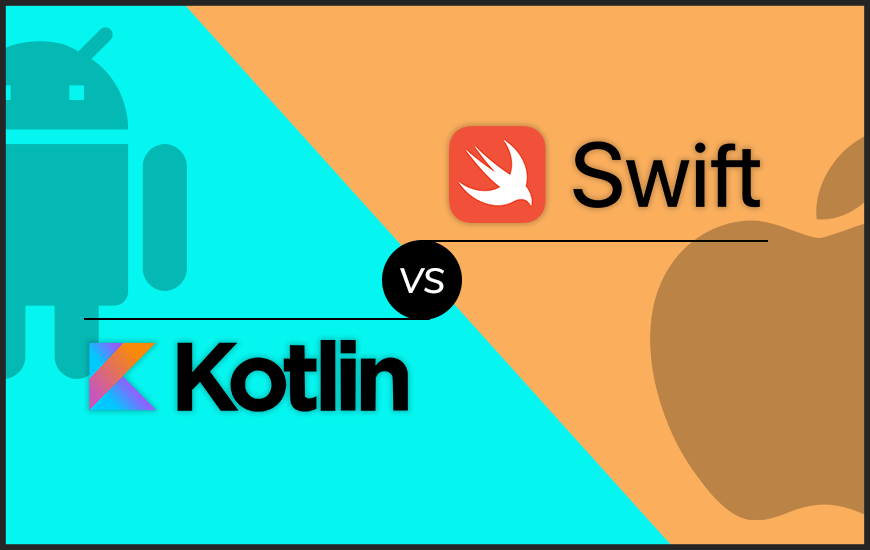Cafdev đã tổng hợp và so sánh mọi thứ trong code của Swift vs Kotlin. Và từ đó thấy sự tường đồng đến bất ngờ của 2 ngôn ngữ này mà ae developer nên biết trước khi muốn học thêm iOS hay Android.
Nội dung chính
Hello World
| Swift | Kotlin |
| print(“Hello, world!”) | println(“Hello, world!”) |
Variables And Constants
| Swift | Kotlin |
| var myVariable = 42 myVariable = 50 let myConstant = 42 | var myVariable = 42 myVariable = 50 val myConstant = 42 |
Explicit Types
| Swift | Kotlin |
| let explicitDouble: Double = 70 | val explicitDouble: Double = 70.0 |
Type Coercion
| Swift | Kotlin |
| let label = “The width is “ let width = 94 let widthLabel = label + String(width) | val label = “The width is “ val width = 94 val widthLabel = label + width |
String Interpolation
| Swift | Kotlin |
| let apples = 3 let oranges = 5 let fruitSummary = “I have (apples + oranges) ” + “pieces of fruit.” | val apples = 3 val oranges = 5 val fruitSummary = “I have ${apples + oranges} ” + “pieces of fruit.” |
Range Operator
Swift
let names = ["Anna", "Alex", "Brian", "Jack"]
let count = names.count
for i in 0..<count {
print("Person \(i + 1) is called \(names[i])")
}
// Person 1 is called Anna
// Person 2 is called Alex
// Person 3 is called Brian
// Person 4 is called Jack
Kotlin
val names = arrayOf("Anna", "Alex", "Brian", "Jack")
val count = names.count()
for (i in 0..count - 1) {
println("Person ${i + 1} is called ${names[i]}")
}
// Person 1 is called Anna
// Person 2 is called Alex
// Person 3 is called Brian
// Person 4 is called Jack
Inclusive Range Operator
Swift
for index in 1...5 {
print("\(index) times 5 is \(index * 5)")
}
// 1 times 5 is 5
// 2 times 5 is 10
// 3 times 5 is 15
// 4 times 5 is 20
// 5 times 5 is 25Kotlin
for (index in 1..5) {
println("$index times 5 is ${index * 5}")
}
// 1 times 5 is 5
// 2 times 5 is 10
// 3 times 5 is 15
// 4 times 5 is 20
// 5 times 5 is 25
COLLECTIONS
Arrays
| Swift | Kotlin |
| var shoppingList = [“catfish”, “water”, “tulips”, “blue paint”] shoppingList[1] = “bottle of water” | val shoppingList = arrayOf(“catfish”, “water”, “tulips”, “blue paint”) shoppingList[1] = “bottle of water” |
Maps Swift
| Swift | Kotlin |
| var occupations = [ “Malcolm”: “Captain”, “Kaylee”: “Mechanic”, ] occupations[“Jayne”] = “Public Relations” | val occupations = mutableMapOf( “Malcolm” to “Captain”, “Kaylee” to “Mechanic” ) occupations[“Jayne”] = “Public Relations” |
Empty Collections
| Swift | Kotlin |
| let emptyArray = [String]() let emptyDictionary = [String: Float]() | val emptyArray = arrayOf() val emptyMap = mapOf() |
FUNCTIONS
Swift
func greet(_ name: String,_ day: String) -> String {
return "Hello \(name), today is \(day)."
}
greet("Cafedev.vn", "Tuesday")
Kotlin
fun greet(name: String, day: String): String {
return "Hello $name, today is $day."
}
greet("Cafedev.vn", "Tuesday")
Tuple Return
Swift
func getGasPrices() -> (Double, Double, Double) {
return (3.59, 3.69, 3.79)
}Kotlin
data class GasPrices(val a: Double, val b: Double,
val c: Double)
fun getGasPrices() = GasPrices(3.59, 3.69, 3.79)
Variable Number Of Arguments
Swift
func sumOf(_ numbers: Int...) -> Int {
var sum = 0
for number in numbers {
sum += number
}
return sum
}
sumOf(42, 597, 12)
Kotlin
fun sumOf(vararg numbers: Int): Int {
var sum = 0
for (number in numbers) {
sum += number
}
return sum
}
sumOf(42, 597, 12)
// sumOf() can also be written in a shorter way:
fun sumOf(vararg numbers: Int) = numbers.sum()
Function Type
Swift
func makeIncrementer() -> (Int -> Int) {
func addOne(number: Int) -> Int {
return 1 + number
}
return addOne
}
let increment = makeIncrementer()
increment(7)
Kotlin
fun makeIncrementer(): (Int) -> Int {
val addOne = fun(number: Int): Int {
return 1 + number
}
return addOne
}
val increment = makeIncrementer()
increment(7)
// makeIncrementer can also be written in a shorter way:
fun makeIncrementer() = fun(number: Int) = 1 + number
Map
| Swift | Kotlin |
| let numbers = [20, 19, 7, 12] numbers.map { 3 * $0 } | val numbers = listOf(20, 19, 7, 12) numbers.map { 3 * it } |
Sort
| Swift | Kotlin |
| var mutableArray = [1, 5, 3, 12, 2] mutableArray.sort() | listOf(1, 5, 3, 12, 2).sorted() |
Named Arguments
Swift
func area(width: Int, height: Int) -> Int {
return width * height
}
area(width: 2, height: 3)
Kotlin
fun area(width: Int, height: Int) = width * height
area(width = 2, height = 3)
// This is also possible with named arguments
area(2, height = 2)
area(height = 3, width = 2)
CLASSES
Swift
class Shape {
var numberOfSides = 0
func simpleDescription() -> String {
return "A shape with \(numberOfSides) sides."
}
}Kotlin
class Shape {
var numberOfSides = 0
fun simpleDescription() =
"A shape with $numberOfSides sides."
}
Sử dụng
Swift
var shape = Shape()
shape.numberOfSides = 7
var shapeDescription = shape.simpleDescription()Kotlin
var shape = Shape()
shape.numberOfSides = 7
var shapeDescription = shape.simpleDescription()
Subclass
Swift
class NamedShape {
var numberOfSides: Int = 0
let name: String
init(name: String) {
self.name = name
}
func simpleDescription() -> String {
return "A shape with \(numberOfSides) sides."
}
}
class Square: NamedShape {
var sideLength: Double
init(sideLength: Double, name: String) {
self.sideLength = sideLength
super.init(name: name)
self.numberOfSides = 4
}
func area() -> Double {
return sideLength * sideLength
}
override func simpleDescription() -> String {
return "A square with sides of length " +
sideLength + "."
}
}
let test = Square(sideLength: 5.2, name: "square")
test.area()
test.simpleDescription()
Kotlin
open class NamedShape(val name: String) {
var numberOfSides = 0
open fun simpleDescription() =
"A shape with $numberOfSides sides."
}
class Square(var sideLength: BigDecimal, name: String) :
NamedShape(name) {
init {
numberOfSides = 4
}
fun area() = sideLength.pow(2)
override fun simpleDescription() =
"A square with sides of length $sideLength."
}
val test = Square(BigDecimal("5.2"), "square")
test.area()
test.simpleDescription()
Checking Type
Swift
var movieCount = 0
var songCount = 0
for item in library {
if item is Movie {
movieCount += 1
} else if item is Song {
songCount += 1
}
}Kotlin
var movieCount = 0
var songCount = 0
for (item in library) {
if (item is Movie) {
++movieCount
} else if (item is Song) {
++songCount
}
}
Pattern Matching
Swift
let nb = 42
switch nb {
case 0...7, 8, 9: print("single digit")
case 10: print("double digits")
case 11...99: print("double digits")
case 100...999: print("triple digits")
default: print("four or more digits")
}
Kotlin
val nb = 42
when (nb) {
in 0..7, 8, 9 -> println("single digit")
10 -> println("double digits")
in 11..99 -> println("double digits")
in 100..999 -> println("triple digits")
else -> println("four or more digits")
}
Downcasting
Swift
for current in someObjects {
if let movie = current as? Movie {
print("Movie: '\(movie.name)', " +
"dir. \(movie.director)")
}
}
Kotlin
for (current in someObjects) {
if (current is Movie) {
println("Movie: '${current.name}', " +
"dir. ${current.director}")
}
}
Protocol
Swift
protocol Nameable {
func name() -> String
}
func f<T: Nameable>(x: T) {
print("Name is " + x.name())
}
Kotlin
interface Nameable {
fun name(): String
}
fun f<T: Nameable>(x: T) {
println("Name is " + x.name())
}
Extensions
Swift
extension Double {
var km: Double { return self * 1_000.0 }
var m: Double { return self }
var cm: Double { return self / 100.0 }
var mm: Double { return self / 1_000.0 }
var ft: Double { return self / 3.28084 }
}
let oneInch = 25.4.mm
print("One inch is \(oneInch) meters")
// prints "One inch is 0.0254 meters"
let threeFeet = 3.ft
print("Three feet is \(threeFeet) meters")
// prints "Three feet is 0.914399970739201 meters"
Kotlin
val Double.km: Double get() = this * 1000
val Double.m: Double get() = this
val Double.cm: Double get() = this / 100
val Double.mm: Double get() = this / 1000
val Double.ft: Double get() = this / 3.28084
val oneInch = 25.4.mm
println("One inch is $oneInch meters")
// prints "One inch is 0.0254 meters"
val threeFeet = 3.0.ft
println("Three feet is $threeFeet meters")
// prints "Three feet is 0.914399970739201 meters"
Tương lại không xa ae developer iOS vs Android có thể nói chuyện với nhau một cách dễ dàng hơn trong code và dev app. Vì có quá nhiều sự tương đồng.









![[Tự học C++] Số dấu phẩy động(float, double,…) trong C++](https://cafedev.vn/wp-content/uploads/2019/12/cafedevn_c_develoment-100x70.jpg)

